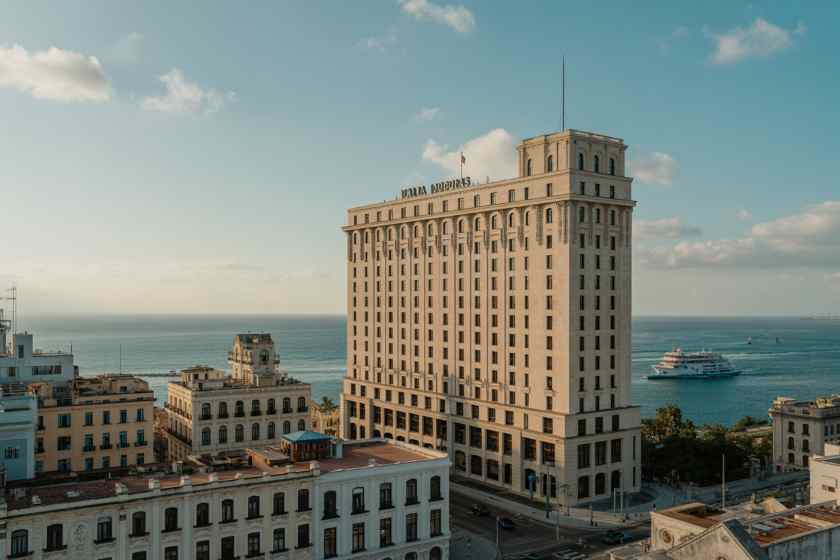
Published on October 27, 2025
With its increasing economic difficulties, Cuba is trying to make significant changes to its tourism sector. To help recover the tourism sector, drastically harmed by the pandemic and heavy bureaucracy, the Cuban government will now permit international hotel chains to lease hotels owned by the state. This new policy is intended to improve productivity, service quality of hotels operated by the state, and increase the number of tourists. The government of Cuba plans to implement the changes at the Iberostar Origin Laguna Azul located in Varadero, Cuba. The Iberostar chain of hotels will begin operation of the leased hotel on January 1, 2026. Iberostar will begin the transition as the first initiative of the Cuban government’s rapid change in the tourism sector.
Shifting Cuba’s Fatih to Iberostar Hotels Headquarters for Investment in Havana
Havana’s Iberostar Hotels Headquarters in Cuba has long been the department’s focus. Havana is now part of Cuban history as the local. Spending on travel in Cuba has soared, providing the perfect opportunity for the chain to strengthen operations.
The mail duty of hotel chains remains unchanged, supported by associations of foreign tour operators. The Cuban government spread about the country’s tourism minister. Subsequently, the country became obsessed with overseas spending in travel to everywhere reachable. The national economy skyrocketed with this ambitious attitude. It also resulted in overwhelming for the travel and tourism sector. The focus became upbeat with growth on all the tourists’ touch digit.
Advertisement
The remote tropical paradises, with long sandy white beaches and palm-fringed azure lagoons, arguably some of the most spectacular in the Caribbean, Cuba’s cracked island. Visitors to Cuba were struck abroad by phrases like exquisite nature, inequalities on a night. Carried through Cuba on a new wave of affluence, tourists found islands lined with palm trees.
This modification is a part of Cuba’s relentless attempts to ameliorate the ever-worsening economic situation underlined by persistent inflation, scarcity of goods, and inadequate foreign currency reserves. By restructuring and amending policies toward the strategic importance of Imbedded Income Illimitables, Payment Inflow and Cuba’s Source Ski Industry, the government is seeking to improve foreign exchange inflow, attract foreign tourist investments, and enhance the overall competitiveness of the tourism industry.
Advertisement
Cuba’s renowned beach resort Varadero will be the testing ground for the new operational model of Iberostar Origin Laguna Azul, as Iberostar will also take on the full operational and economic responsibility. According to these initial and relative performance indicators, the resort is among the first on the new leasing model, and the performance will indicate and inform the potential proliferation of the model to the rest of the Cuban geographic tourism zones.
Problems with the Cuban tourism offer.
International tourism was one of the key industries supporting the economics of Cuba in 2018 when the country was visited by a record number of tourists. Despite the first attempts being made around the United, the country is still falling in a considerable gap of the preceding socio-economic situation. In in 2025, Cuba is anticipating 1.8 million was a bullish and highly optimistic estimate with no concrete plans in place.
The present-day economic struggles being faced in the country, including a persistent deficit of food, fuel, and other vital elements, have reinforced the issues surrounding the inbound tourism industry. From the tourism activities on the island, along with the medical exports and remittances, the industry provides a key area for economic recovery and sustenance. Thus, the state’s strategy in addressing these issues is to lease and commercially exploit state-owned hotels by sending them to administer to deepen the helping hands. This is geared towards encouraging investment and expertise injection on the country infrastructure.
International Hotel Chains and Their Along With Cuba’s Steps on Easing Remittance Visa Policy
Cuban tourism infrastructure improvement includes the advancement of tourism facilities and the opening of the first roads for international investment, in the first place for Chains of Iberostar and other Cubans and out of the country hotel chains. The advancement of tourism facilities of the Cubaan chains in more modern hospitality with the international chains in hospitality is, with unthisin, raising the country more customer and investor welcoming, from the international chains on more. This is also and additionally the strategy of the Cuban state on deepening chains self at these Cubans of more in these international units self of deepening the service standards of operation and, chains on, these international.
The Iberostar involvement pilot projects will undergo an evaluation process at intervals to determine their success. As per EFE reports, terms of the contracts will be determined case-by-case, with no uniform standard. This implies that every contract made between the Cuban state and the foreign chain of hotels will be tailored specifically to correspond with the requirements of the hotels and the markets they operate.
Tourism in Varadero: A Key Destination for Foreign Visitors
Varadero, one of the most attractive beaches in the country, will be the focus of this new approach to tourist immigration. Varadero has a long-standing reputation among foreign tourists, especially Canadians, Europeans, and Americans. The resplendent beaches, opulent hotels, and buzzing nightlife are just a fraction of the available amenities in this previously mentioned region. The zone has a variety of hotels, resorts, and places of interest, which makes it an attractive region for rest and cultural tourism.
As a means to enhance the global reach of tourism in the country, the government of Cuba intends to continue the improvement of the Iberostar Origin Laguna Azul resort, and hopes to engage Varadero within the Iberostar network so that Varadero would be able to provide a better-operating system in the context of quality and diversity of accommodations, and variety of tourism services with the guarantee of providing a sustainable operational model that responds to the new global tourism standards. Thus, the operational model system is designed to sustain the improvement in tourist services offered, and the Varadero resort is cheaper in terms of hotel expenses than other Iberostar network hotels in Cuba. Varadero also has the advantage of a better concentration with the growing international pot of tourism.
Consequences of the Cuban Tourism Market in General. Although Varadero is the region Austria is keen to invest in under the new agreement with Iberostar, the aim is to assimilate this operational model in other regions of the country. The Spanish government is keen to scale this model up to other unique tourism regions of the island, such as Santiago de Cuba, the capital, Cienfuegos, and Trinidad. These regions, with their unique geographic position and rich history of attracting global travellers, have poorly structured infrastructure, and only international hotel tariffs can help recover their infrastructure investment through the world airline ticketing network.
Above all, Varadero will profit from the new Iberostar operational model on a faster basis, where sustainable tourism already has a capital-improving network like the International Fund for Marine Conservation. Varadero must also align with international standards of providing distinctive service to eco-responsive facilities that help start global tourism.
Conclusion: Ending Cuba’s Tourism Drought
The leasing of hotels for foreign brands constitutes a major departure in Cuba’s approach to tourism development. Alongside Iberostar, Cuba aims to boost tourism revenues, bolster service quality, and fortify its image in the Caribbean by expanding its market share. The Iberostar Origin Laguna Azul and Iberostar Origin Laguna Azul will serve as pilot projects to draw pertinent lessons on how the tourism industry can be restructured to increase visitation to the idyllic sites Cuba has to offer.
Advertisement


